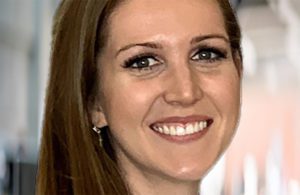
Sarah Ehrlich [Photo courtesy of Argon Medical Devices]
Sarah Ehrlich, sustaining mechanical engineer at Argon Medical Devices, holds a B.S in mechanical engineering from the University of Texas at Tyler.
“My parents knew I would become an engineer before I did,” she said. “Growing up, I was the big sister who put back together whatever my younger siblings decided to tear apart. I started as an English major in college with aspirations of becoming a journalist. However, I grew bored and desired something more challenging, where I could make an impact, help solve problems, and improve someone’s quality of life. That is when my dad suggested engineering. I switched programs and knew that this was where I am supposed to be. Fast forward and I am a part of the CIP Team (Sustaining Engineering) where I have the privilege of working on projects which improve product quality, grow the company’s portfolio, and solve challenges related to new product launches or ongoing design changes.”
What first drew you to medtech? When did you first know you wanted to be in the industry?
Ehrlich: During a lecture in Linear Circuits, my professor used the example of an EKG to introduce noise removal techniques. I knew instantly that I wanted to apply the tools and knowledge I would learn throughout my undergrad in the medical field in order to help people – to contribute in developing and improving medical devices/ technology in order to enhance the lives of patients and end users. What could be more rewarding?
What projects, past or present, have made you love what you do?
Ehrlich: In full transparency, all my projects while at Argon have only confirmed my love for working in the medical field. With each project, I can make an impact and be a positive resource for my team, other departments, and the company all the while achieving the ultimate goal of providing improvement for others.
What projects are you most looking forward to?
Ehrlich: Each project we are assigned on the CIP Team is different. It could range from a line extension, improving product quality, or teaming up with Regulatory for submission assistance just to name a few examples. I look forward to managing, executing, and closing any project that I have been entrusted to complete.
What are some of the barriers women face in today’s medtech industry, if any?
Ehrlich: While working for my manager and mentor Naren, never has the thought “must be because I am a woman” crossed my mind. He goes above and beyond (and then some) in encouraging, challenging, and guiding me to be successful in all aspects of life. During my time here at Argon, it has been very exciting to an increase in female engineers across manufacturing, product development and sustaining engineering. It is my hope that all women who step into the medtech industry do not experience a situation where they question if their gender had an impact.
Describe your biggest leadership challenge. How did you conquer it or resolve it, or what was the outcome?
Ehrlich: Communication. I know – this is one of the most important qualities for a successful project manager. I tend to lean on the side of quiet, introverted tendencies and take the burden of picking up slack, missed tasks or any failures upon myself to resolve without “bothering” the team. While there has been improvement, this is a challenge I am still working on with help from my very patient mentor because you can always be better at communicating.
Talk about your leadership skills. What is the most important lesson you have learned that has guided you in your career?
Ehrlich: During one of the very first conversations, I had with my mentor, he gave me six qualities that are vital as a leader: ethics, Quality, qigor, transparency, Integrity, and amorphous/servant leadership. All six guide me throughout my career as I strive to do my best no matter what is on my plate.
In your opinion, what more can be done to promote greater participation of young women in the medtech industry today?
Ehrlich: Communicate the accomplishments and successes of women in medtech industry. Encouragement to pursue a STEM path that could lead to the medtech industry should not be limited to those ready to start a career. We should also focus on the young girls and providing them the encouragement and opportunities to develop their problem solving and critical thinking skills and expose them to the impacts that they could make in the medtech industry.
Why is it important for companies to be more inclusive and have more women in charge?
Ehrlich: If a company is inclusive, that shows me they value different viewpoints. How could you fail if you have the opportunity to look at a problem or task from various perspectives? It takes a team and being more inclusive and promoting women into position of leadership and decision making could only strengthen the outcomes within a company.